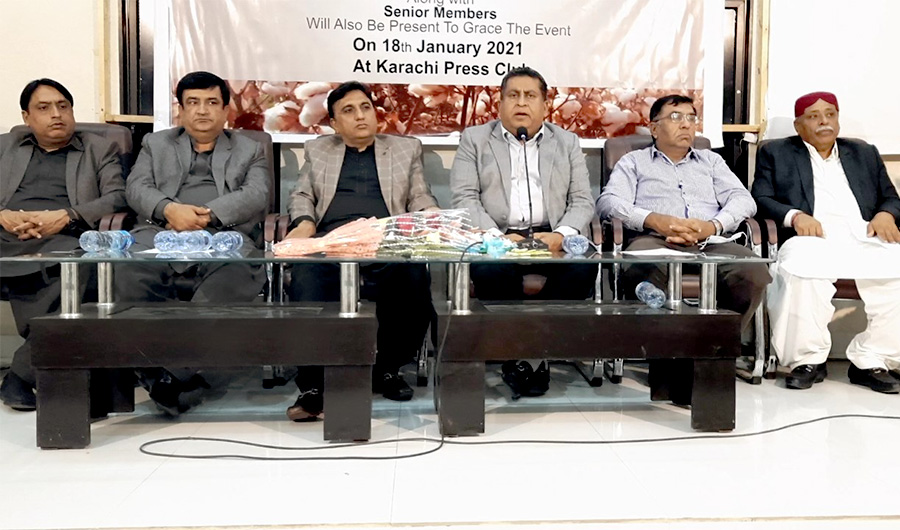KARACHI: Pakistan’s cotton production has declined by 34 percent to 5.5 million bales, the lowest output in three decades, as new government incentives have pushed farmers to switch to sugarcane, maize and rice cultivation, a national association of ginners said.
Cotton is a major driver of the economy, contributing around one percent of GDP, according to the Pakistan Bureau of Statistics.
“Cotton production has come down to 5.5 million bales as of January 15, 2021, as compared to last year’s total output of 8.3 million bales,” Dr. Jassu Mal T. Leemani, chairman of the Pakistan Cotton Ginners Association (PCGA), said at a press conference in Karachi on Monday.

Dr. Jassu Mal T. Leemani, Chairman of Pakistan Cotton Ginners’ Association (PCGA) along with other officials speaking at a press conference held at Karachi Press Club on January 18, 2020. (AN Photo)
“Cotton cultivation [in area] has declined by 35% since 2014-15 because farmers have shifted to sugar cane from cotton because of higher government support prices,” he added, saying bad weather conditions and lack of certified seeds had also contributed to the decline.
“The country had achieved the highest output of 15 million bales in 2014-15 but since then production is on the decline which forces the country to import cotton to meet domestic textile sector’s requirement,” Leemani said.
Cotton is also the lifeline of Pakistan’s textile industry, which accounts for more than half of the country’s exports.
Analysts say textile mills will need to import 7-8 million bales of cotton this year for export growth to continue.
“The import of the cotton and related products are expected to cost around $3 billion,” Naseem Usman Osawala, a senior cotton broker and analyst, said.
Pakistan’s imports of raw cotton increased by 512 percent to $532 million in the first six months of the current fiscal year. The country imported $880 million worth of raw cotton during the last fiscal year, which was 14.67 percent higher than the previous year, according to the Pakistan Bureau of Statistics.
Pakistani central bank data shows cotton cultivation dropped by 11.9% in the current fiscal year to 2.2 million hectares, the lowest since fiscal year 1982. The cotton crop suffered due to exceptionally heavy monsoon rains and pest attacks, according to the central bank.
Analysts say due to the shortage, the price of cotton in the local market has increased substantially after almost nine years.
“The spot rates of cotton are hovering around Rs 11,000 per bale (40 Kg) which is close to the all-time high of Rs 14,000 recorded back in 2010-11,” Osawala said. “The international market is also tight due to short supply.”
Ginners said declining cotton output had closed down more than 60 percent of ginning factories across Pakistan, forcing thousands out of jobs. The livelihoods of around 1.5 million farmers are directly associated with cotton harvesting in Pakistan.
“Out of 1,200 ginning factories, only around 500 are operational, that also at less than half of the production capacity,” PCGA’s Leemani said. “For the revival of the cotton sector we demand establishment of a cotton control board and cotton zoning where other crops should be banned.”















